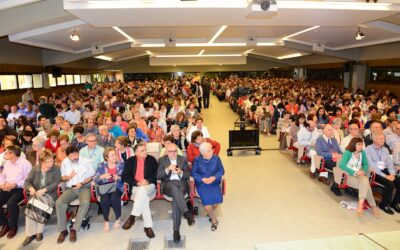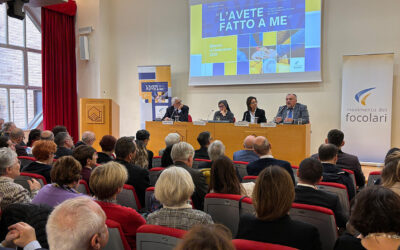 More than a thousand people were in attendance at the Civic Theatre in Trent for the international ecumenical day dedicated to Chiara Lubich on this third anniversary of her death. The gathering held on March 12, included representatives from twenty churches: cardinals, bishops, metropolitans, and pastors. There were also politicians and people from the world of culture and the arts.
More than a thousand people were in attendance at the Civic Theatre in Trent for the international ecumenical day dedicated to Chiara Lubich on this third anniversary of her death. The gathering held on March 12, included representatives from twenty churches: cardinals, bishops, metropolitans, and pastors. There were also politicians and people from the world of culture and the arts.
In theater boxes, audience and on stage were faces of Greek and Russian Orthodoxy mingled with the testimony of Anglicans, Syrian Orthodox, Catholic, Reformed. The music intertwined with the chants from the Arab world of the Far East without any traces of syncretism. Indeed, the unique identities of each group of persons were preserved and undiminished, but the passion proposed by Chiara Lubich, for over fifty years, “that all be one” was strongly shared beyond every differences.
Many of the messages that arrived from religious authorities of the various churches had quite a very familiar tone, like the one from Bartholemew I, Patriarch of Constantinople. His greeting was filled with the affection which has characterized the long friendship that has linked the Patriarch to the Focolare: “Chiara has taught us a method for recomposing fraternity, relationships of genuine sharing that are capable of dispelling indifference.”
“The day-to-day relationships and the widespread diffusion of dialogue were a fundamental contribution to the ecumenical movement,” underscored Cardinal Koch, President of the Pontifical Council for the Unity of Christians, as he expressed a personal concern: “counterpositioning that at times is manifested between an ecumenism from above and an ecumenism from below.” Maria Voce echoed the cardinal’s criticism: “ecumism from below and from above, they must walk together. If theological breakthroughs are not accompanied by true reciprocal relations from below, then these breakthroughs will not be greatly efficacious; whereas, if there is an ecumenism from below they will be important and longlasting.
Starting today, at the Mariapolis Center in Cadine (Trent), an ecumenical school will begin with 400 persons who will delve into the life of the Word and the themes of the day. There will be a celebration for Centro Uno which is celebrating its 50th anniversary of ecumenical action, which will offer an occasion to strengthen the dialogue of life.
Still in Trent, the journalist Franco de Battaglia presented his new book, A Trento con Chiara Lubich, which is dedicated to the sites of the Focolare Movement’s birth. It is a type of guide book for apparantly insignificant corners of the city which actually served as the cradle of the spirituality of unity.




0 Comments